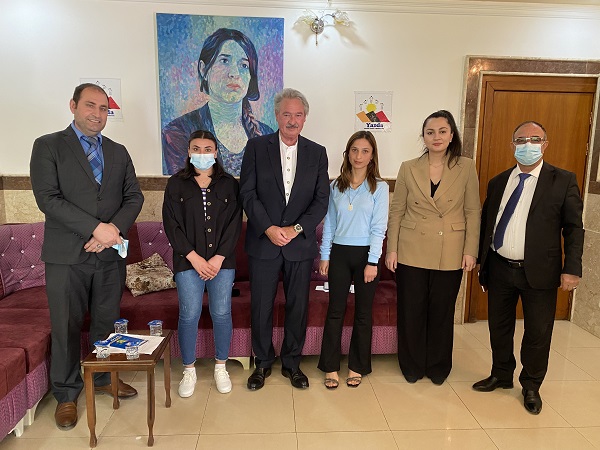 Luxembourg's Foreign Minister Jean Asselborn with Yazidi survivors and representatives of the NGO Yazda;
Credit: MAEE
Luxembourg's Foreign Minister Jean Asselborn with Yazidi survivors and representatives of the NGO Yazda;
Credit: MAEE
On the last day of his working visit to Iraq, on Thursday 31 March 2022, Luxembourg's Minister of Foreign and European Affairs, Jean Asselborn, travelled to Duhok, where he met with survivors of the genocide of Yazidis by the slamic State in Iraq and the Levant (ISIL) and visited a displacement camp.
Nearly eight years after the massacres committed by ISIL against the Yazidi, more than 2,700 members of the community, including many women and children, are still missing, and the number of displaced Yazidi survivors is estimated at around 400,000 people. Iraqi law recognises the crimes committed by ISIL against the Yazidi, Christian, Turkmen, and Shabak communities as genocide and crimes against humanity.
Minister Asselborn began his visit to Duhok at the offices of the non-governmental organisation (NGO) Yazda, where he spoke with two Yazidi survivors who are now involved in the fight against impunity for crimes committed by ISIL and in the prevention of new atrocities. Luxembourg's Foreign Minister congratulated the two young women for their courageous work and assured them of Luxembourg's support, including within the framework of its mandate on the United Nations (UN) Human Rights Council. Through the Directorate for Development Cooperation and Humanitarian Affairs of Luxembourg's Ministry of Foreign and European Affairs, the Grand Duchy also supports the NGO Yazda in its work to promote access to mental health and psychosocial support services, as well as legal services, for displaced persons in Iraq.
Minister Asselborn then met with the officials of the office of the International Organization for Migration (IOM) as well as with representatives of several local NGOs that help displaced populations in order to learn more about their work.
During a lunch with the Governor of Duhok, Ali Tatar, Minister Asselborn inquired about the challenges that the province is facing in the area of hosting displaced people who have fled the crimes of ISIL since 2014. The minister thanked his interlocutor by expressing his deep respect for the solidarity shown by the province of Duhok and the Kurdish people over the past eight years.
Finally, Minister Asselborn went to the displacement camp for displaced persons in Khanke where he spoke with residents and IOM officials. This camp is one of fourteen internally displaced person (IDP) camps in the province and is home to around 14,000 people. The IOM and NGOs working in this camp provide health services, education and training and preparation for employment to support the displaced people. The lack of long-term perspective weighs heavily on these people, who cannot yet return to the Sinjar valley from which they had to flee, because the security situation there remains precarious.








